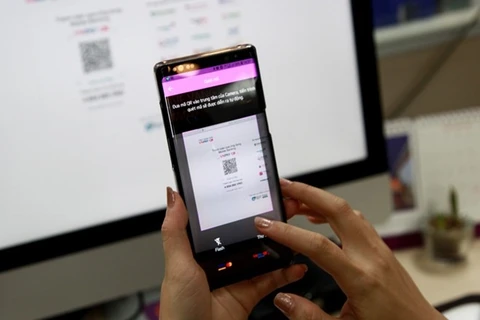Hanoi (VNS/VNA) - Transaction limits for e-wallets should be set at appropriate levels to encourage cashless payment amidst an anticipated boom of e-commerce in Vietnam, experts have said.
Under a draft circular about intermediary payment services the State Bank of Vietnam recently made public, e-wallet daily transaction limits were set at 20 million VND (850 USD) for individuals and 100 million VND for organisations. The monthly transaction limits were set at 100 million VND and 500 million VND, respectively.
Pham Tien Dung, director of the State Bank of Vietnam’s Payment Department, said at a conference late last week that setting daily and monthly transaction limits for e-wallets aimed to prevent them being used for illegal purposes like tax evasion or money laundering.
Dung pointed out that transaction value via e-wallets in Vietnam is currently modest, averaging about 200,000 VND per transaction.
Can Van Luc, a senior economist of the Bank for Investment and Development of Vietnam, said setting inappropriate monthly transaction limits would hinder the development of e-payment, adding that the limit for individuals should be increased to 150 million-200 million VND.
“More consideration should be given on the transaction limits for e-wallets,” Luc said.
He said limits should be set based on income per capita and consumption demand.
E-payment has significant potential in Vietnam, given the country’s young population, high rate of smartphone users (55 percent) and rapidly growing e-commerce segment, Luc said.
Nguyen Ba Diep, CEO of e-wallet company Momo, said transaction limits should be set at higher levels to prepare for the anticipated rapid development of e-payment.
Diep said monthly limits for individuals should be increased to 200 million VND while no limits should be set for organisations.
According to Nguyen Thanh Hung, chairman of Vietnam e-Commerce Association, Vietnam’s e-commerce industry has been predicted to develop rapidly, reaching a value of 33 billion USD by 2025 from 8 billion USD today, but this would depend on the development of online payments.
Hung said it was necessary to create favourable conditions for the development of e-payment to drive a boom in e-commerce.
Hung said transaction limits should be flexible, adding that those with demand for higher limits should be allowed to have them.
Tran Quang Huy, head of Fintech Club under the Vietnam Banks Association, proposed e-wallet transaction limits should be removed.
E-wallets were not meant for only small transactions, experts said.
Experts also said careful consideration should be given to regulations on the procedures to open e-wallets and the number of e-wallets one could own.
According to Dung, it was important to create a favourable environment for e-payment but risks must be kept under control.
Vietnam is seeing rapid development of fintech companies and system security and safety is the first priority, Dung said.
Dung stressed that the State Bank of Vietnam wants to develop policies and regulations which would promote cashless payment and keep risks under control.
The central bank's statistics showed that as of February, 2019, Vietnam had 29 non-bank companies with licenses to provide intermediary payment services. - VNS/VNA
VNA

























